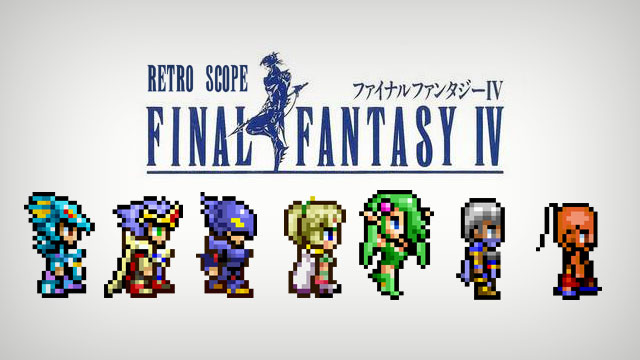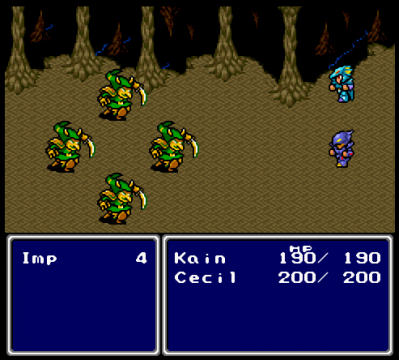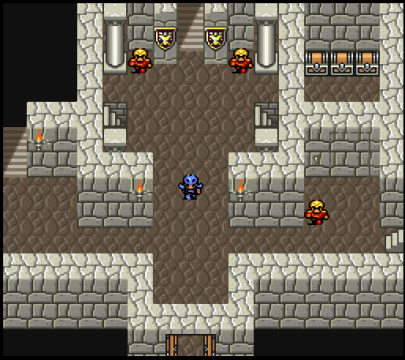
The first time I ever even heard of the second installment of the Final Fantasy series was actually while playing the first game with my next door neighbor. When he was naming his characters, he kept naming his warrior Cecil, his white mage Rosa, his black belt Edge, and I think he named his monk Kain (which I came to find didn’t quite fit). I kept seeing him do this, so one day I asked why, assuming that maybe those were the names that were supposed to be used. He then said something about how the second game’s characters are named that. Of course, this got me curious.
It wouldn’t be until a few months later when my neighbors bought Final Fantasy IV (which was known as Final Fantasy II at the time) when I actually got to experience it. The first game was more open-ended and vague with characters, but this one… this one was different. The main characters had long and storied histories, underwent many changes, and you grew with them as they endured the highest of highs and lowest of lows. No more bland personalities for this series, that’s for sure (at least, in the Nintendo era).
The thing that really strikes me about the beginning is how you’re led to believe that you’re the good guys in some respects. It’s not until Cecil begins to question the king that you realize you’re not exactly on the right side of the fight. I always loved the introduction to this game with the Red Wings and the stealing of the Water Crystal because of the moral ambiguity. It really gives a lot of depth to the character of Cecil. It makes his journey to becoming a paladin all the more satisfying.

The game wraps you up into a world unlike the previous US installment with established characters, a deep narrative, and a world that is as grand as you can get with a 16-bit system. The characters are particularly fascinating and their interactions with each other are on top of that. It’s not all happy-go-lucky relationships. There’s tension and there are problems within the characters’ relationships. Cecil’s past makes him untrustworthy to Rydia, Kain’s unrequited love for Rosa makes him a prime target for brainwashing, Tellah feels resentment Edward due to the death of his daughter (who was Edward’s love), and I haven’t even touched upon the whole Golbez and Cecil thing. That is a relationship that is worth a whole article of its own.
This may be the first game that ever got me a little emotional, though not to the level where I was crying my eyes out. Only one game holds that distinction in my book (Professor Layton and the Diabolical Box). Still, this one had a lot of moments that got me misty eyed and sad. And the moments just keep coming like a tidal wave. First it’s Rydia’s losing her mother and summoning an earthquake in grief after Cecil destroyed her whole village. After that you get a bunch of moments like the death of Anna, the twins’ sacrifice, Tellah’s sacrifice… actually, everybody’s had a sacrifice, it seems. Sure, most of them aren’t permanent, but at the time you had no idea. The moment that got to me the most was when Edge had to watch as his parents, who were turned into demons, sacrificed themselves instead of going to attack Edge. It’s such a testament to the love between parents and their child. And it’s just so painful watching that whole situation unfold knowing that there’s nothing that you can do.
My absolute favorite part of the entire game is during the final battle against Zeromus. It seems as if all is lost. You and your whole party are gone. Zeromus is cackling evilly at what he has done. Meanwhile at the tower where all the allies and party members you have not used are staying, the Elder instructs everybody to use their prayers to help your team along. Suddenly, you see Cecil rise up and confront Zeromus as he grabs that crystal from Golbez. But rather than saying “I won’t lose,” or “I’ll never lose” like you’d expect to hear, he says, “I can’t lose.” There something about that phrasing that I absolutely love. He’s obligated and he’s not going to give up that obligation for anything. Two by two, the characters that were in your party before and your allies (new and old) come into the fray, giving you their strength and encouragement. As they do so, your entire party ends up healed and then comes the real battle. It’s just so majestic and inspiring. It makes you want to really kick Zeromus’ ass. Throw in the usage of the Final Fantasy Prologue theme in there and you have yourself one hell of a moment.

Speaking of the prologue, how about that music? Nobuo Uematsu’s soundtrack is amped up big time for Final Fantasy IV as you get a whole new collection of tunes. The Prologue and Prelude themes are still there and are fantastic as ever. In fact, they’re arguably even better in 16-bit than in 8-bit (your mileage may vary here). Then you have so many other themes that run the gamut from delightfully pleasant to sinister and brooding to inspiring and all other emotions you can think of. I’d like to talk about three of the songs that always stuck with me that aren’t the Prelude and Prologue. The first one is the Red Wings theme. It’s such a dark and powerful theme. Even though you feel like you may be on the side of good, the Red Wings theme gives a musical cue that perhaps your original perception is all wrong. It’s a great song that fits the great opening of this game. The second one is “The Melody of Lute,” which is the quiet and lovely tune that Edward plays to keep the Dark Elf at bay, allowing Cecil and the others to defeat him. It’s also played when Anna’s ghost visits him and tells him to be strong. The final one is “Battle with the Four Fiends.” It’s the battle music that plays when you fight the four fiends (self-explanatory, I know). There’s such a suspenseful feel to it as you are in battle and you hear that music playing. The classical influence and what sounds like it could be a minor key really brings it together. Of course, these are only three of several fantastic and timeless tunes on this game’s soundtrack.
Admittedly, this game is not as good as Final Fantasy VI which itself is a masterpiece. This one has its flaws, but it’s definitely the one I like better. It’s the one I have the fondest childhood memories of, it’s the one that showed me that video games can evoke emotions in players, and it’s the one that I love talking about. That’s all just a matter of preference, though. Time and time again, I usually see Final Fantasy IV get overlooked and forgotten about when it comes to great SNES games in favor of the later installment. Thankfully, the countless remakes have helped keep it relevant enough, but I feel like the quality of this game is not appreciated as much as it should be. This is a great game well worth playing.




 ShareThis
ShareThis






